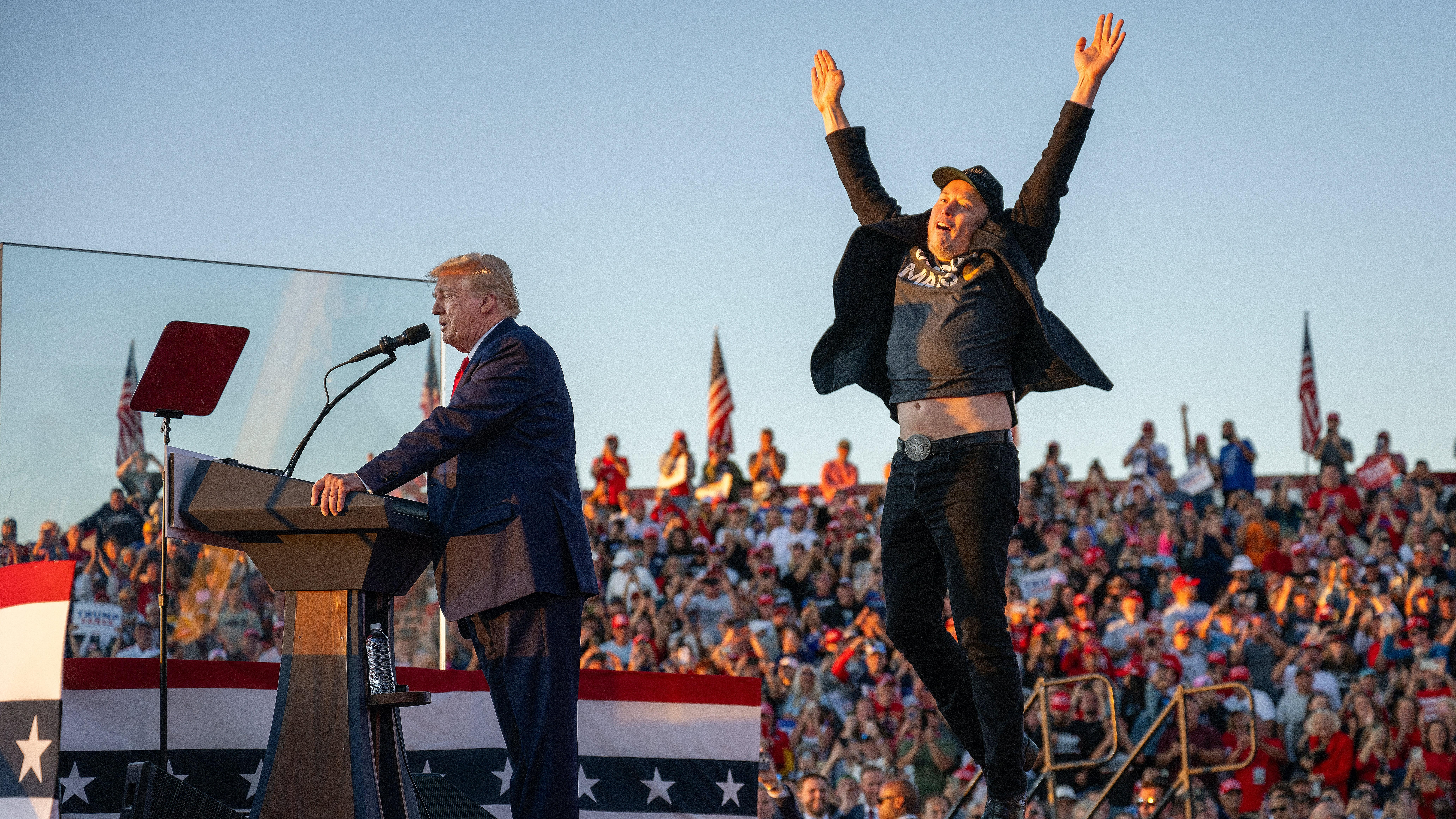Elon Musk May Use Donald Trump To Bolster Tesla
If Trump gets elected on November 5, the two billionaires may butt heads over a number of issues.
On the face of it, Donald Trump seems like he'd be a disaster for Elon Musk's various companies, especially Tesla, a company that makes the very electric vehicles Trump has fought against. That may not end up mattering, because a second Trump presidency could actually work out very well for the world's richest man. It won't work out for folks like you and me, but he'll be just fine.
That's why Must has spent over $75 million supporting the Trump campaign and been a huge surrogate for him in Pennsylvania, a crucial battleground state. Experts believe Musk is trying to curry serious favor with Trump in order to get access to everything he needs from a governmental perspective to make Tesla bigger than ever, according to the New York Times. In order to make that happen, Musk has to overcome the very big gap between what he wants out of Trump and what policies Trump plans to enact.
It's going to be an uphill battle from the very start. I mean, Tesla collects billions of dollars from programs supported by Democrats like President Biden. These are the very programs Trump and other Republicans have vowed to take away. Then, of course, there's the issue of Trump's general dislike of EVs. From the New York Times:
In Michigan, a battleground state and home to many auto factories, the Trump campaign has run ads that claim that Vice President Kamala Harris, the Democratic presidential nominee, wants to "end all gas-powered cars" — a position that she does not hold.
During Mr. Trump's previous term as president, "one of the first things he did in office was to attempt to roll back vehicle pollution standards and attack clean cars and Obama-era regulations," said Katherine Garcia, director of the Clean Transportation for All Campaign at the Sierra Club.
In theory, Mr. Musk could act as a brake on Republican efforts to eliminate programs that promote electric cars. But his political capital would be finite, and he might use his influence to ease regulatory scrutiny of Tesla self-driving technology or to preserve clean air credits that have added billions of dollars to Tesla's bottom line.
Musk would probably also need to decide whether to prioritize Tesla or his other businesses, such as SpaceX. The U.S. government and that company are deeply intertwined when it comes to space travel and rocket launches, as the Times explains:
"He wouldn't be throwing his weight behind Trump if he didn't think there was a benefit to him and his companies," said Will Rhind, chief executive of GraniteShares, an investment firm that offers funds focused on Tesla. "Clearly he's betting on a horse for a reason."
Tesla did not respond to requests for comment. The Trump campaign cited a recent interview in which Mr. Trump acknowledged that he and Mr. Musk disagreed "a little bit on the electric car." The former president said he would terminate "on the first day" what he called electric car mandates. He added, "We want electric cars, but we want, really, to have all cars."
Here are some more sticking points Musk and Trump's bromance may soon face if November 5 goes the way of MAGA. From the New York Times:
Clean Air Credits
The Environmental Protection Agency and California require automakers to meet pollution standards or buy credits from companies like Tesla that exceed those standards. Preserving those credits might be a priority for Mr. Musk.
In the third quarter, Tesla earned $739 million, or one-third of its profit, from selling clean air credits. In past years, the credits helped Mr. Musk meet financial milestones in a compensation package that helped make him the world's richest person.
But plenty of interested parties would like to kill the credits, not only Republicans but also other automakers that aren't selling enough electric cars to comply with pollution standards.
[...]
Autonomous-Driving Rules
Mr. Musk has staked Tesla's future on technology that he says will allow his cars to drive without human intervention. "It should be, frankly, blindingly obvious at this point that is the future," Mr. Musk told investors last week.
But regulators have sometimes stood in the way. The National Highway Traffic Safety Administration said this month that it was investigating whether a Tesla system that the company calls "full self-driving (supervised)" was responsible for four collisions, including one that killed a pedestrian.
Mr. Musk could be expected to use his pull in the White House to try to get federal officials to back off. Tesla previously disclosed that the Justice Department was also investigating its autonomous driving technology.
He might also push for a federal law governing autonomous driving to override a patchwork of state laws. That would be one of his priorities if Mr. Trump kept his promise to install him as head of a "government efficiency" panel, Mr. Musk said last week.
[...]
Views of Electric Vehicles
As a convert to the Trump cause, Mr. Musk could soften Republican aversion to electric vehicles. Surveys show that Democrats are far more likely than Republicans to buy battery-powered cars.
But Mike Murphy, a longtime Republican political operative who is chief executive of the EV Politics Project, a group that aims to get conservatives to embrace such cars and trucks, was not optimistic.
"Elon is becoming someone in the MAGA world," Mr. Murphy said. But changing Republicans' views of electric vehicles, he added, "is a big needle to move."
